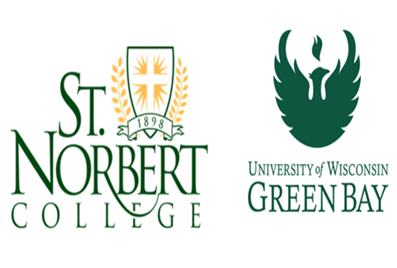
UW- Green Bay & St. Norbert College Announce Program Partnership
In a first-of-its-kind partnership in the region, UW-Green Bay (UWGB) has signed an articulation agreement with St. Norbert College (SNC) today that will allow students in selected degree programs to seamlessly study at both institutions. Program partnerships may start as soon as Fall of 2024.
This sharing of resources provides students from the region (and beyond) with an opportunity to take classes more easily at either of the Northeast Wisconsin four-year campuses, regardless of campus residence or enrollment. The agreement focuses on the student’s needs and provides more opportunities for degree pursuit where a student can augment the general education they receive at one school with a degree program available at the other.
For example, a St. Norbert student could access the courses needed for a degree in Engineering through offerings at UWGB, or a UWGB student could complete their Economics or Engineering Physics major with courses provided at SNC.
Unprecedented in the region, this partnership effectively combines the resources of both institutions. In other programs SNC students can complete three years at SNC and then the final two years at UWGB to earn their undergraduate and graduate degree. SNC will honor the UWGB tuition rate where applicable when UWGB students take classes at SNC, and vice versa.
“This collaboration with UW-Green Bay is a win-win for both institutions–and most importantly for the students we serve,” said Laurie M. Joyner, Ph.D., president of St. Norbert College. “This partnership strengthens our Norbertine tradition of engagement in the local community. And given the enrollment and financial challenges in higher education today, these partnerships are critical in providing the best well-rounded education students want and deserve,” said Joyner.
“Students win when institutions collaborate to build on the strengths that each college brings to the communities they serve,” said UW-Green Bay Chancellor Michael Alexander. “Rather than try to provide everything our region needs in higher education on our own, students and the community become better when we partner with each other, ensuring our students and the region can benefit from having two stronger, yet different institutions.”
Read More HERE.

